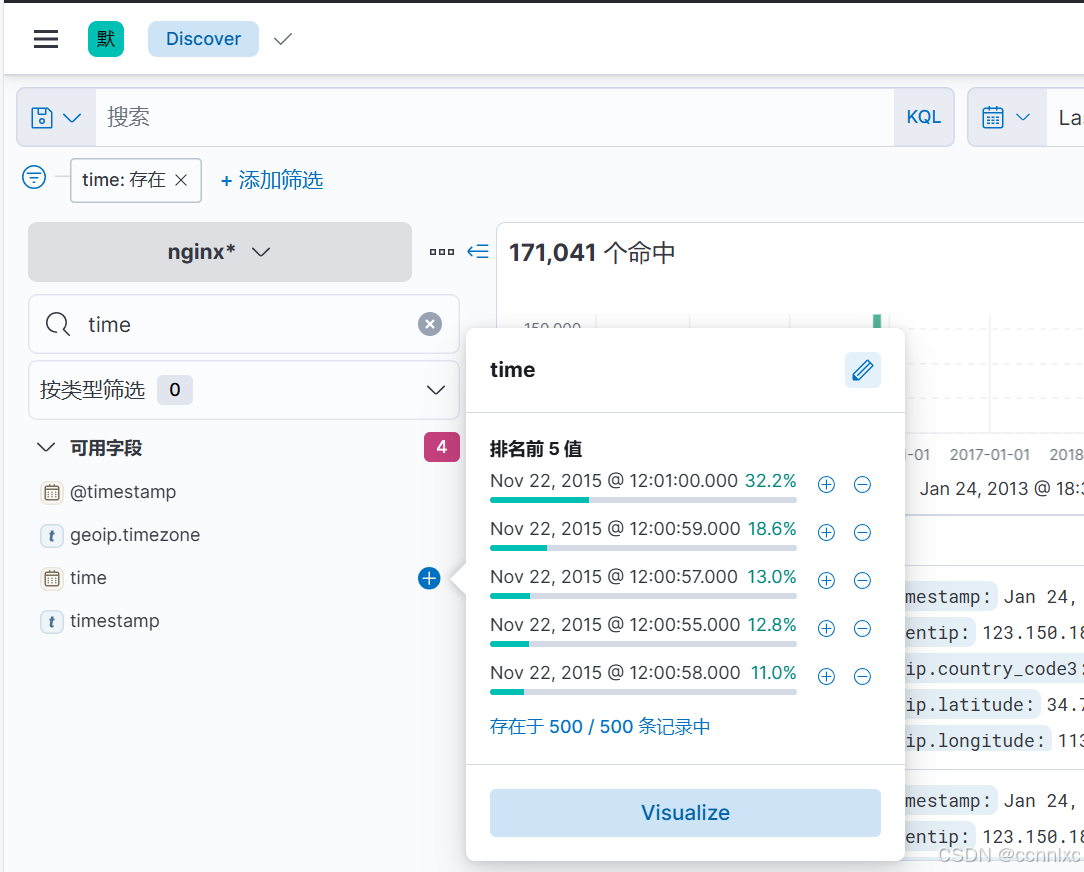1.filebeat的input类型之filestream实战案例:
在7.16版本中已经弃用log类型,之后需要使用filebeat,与log不同,filebeat的message无需设置就是顶级字段
1.1简单使用:
filebeat.inputs:
- type: filestream
enabled: true
paths:
- /tmp/myfilestream01.log
output.console:
pretty: true1.2解析json格式数据
filebeat.inputs:
# 指定类型为filestream,在7.16版本中已经弃用log类型
- type: filestream
enabled: true
paths:
- /tmp/myfilestream02.log
parsers:
# 配置json格式解析
- ndjson:
# 将错误消息记录到error字段中
add_error_key: true
# 如果解析的json格式字段和filebeat内置的顶级字段冲突,则覆盖,默认是不覆盖的。
overwrite_keys: true
# 将message解析的字段放入一个自定义的字段下。若不指定该字段,则默认解析的键值对会在顶级字段.
target: readjson
output.console:
pretty: true1.3多行合并案例
filebeat.inputs:
# 指定类型为filestream,在7.16版本中已经弃用log类型
- type: filestream
enabled: true
paths:
- /tmp/myfilestream02.log
parsers:
- multiline:
type: count
count_lines: 4
- ndjson:
add_error_key: true
overwrite_keys: true
target: readjson
output.console:
pretty: true2.写入数据到es集群
filebeat.inputs:
- type: filestream
enabled: true
paths:
- /tmp/shopping.json
parsers:
- multiline:
type: count
count_lines: 7
- ndjson:
add_error_key: true
overwrite_keys: true
# 将日志输出到ES集群
output.elasticsearch:
# 指定ES集群地址
hosts: ["http://10.0.0.101:9200","http://10.0.0.102:9200","http://10.0.0.103:9200"]
# 指定索引
index: "shopping-%{+yyyy.MM.dd}-output"
# 禁用索引声明管理周期,若不禁用则自动忽略自定义索引名称
setup.ilm.enabled: false
# 设置索引模板的名称
setup.template.name: "lxc-shopping"
# 指定索引模板的匹配模式
setup.template.pattern: "lxc-shopping-*"
# 是否覆盖原有的索引模板
setup.template.overwrite: true
# 设置索引模板
setup.template.settings:
# 指定分片数量为8
index.number_of_shards: 8
# 指定副本数量为0
index.number_of_replicas: 03.多数据源写入es集群不同索引
filebeat.inputs:
- type: filestream
enabled: true
tags: "json"
paths:
- /tmp/ceshi.json
parsers:
- ndjson:
add_error_key: true
#overwrite_keys: true
- type: filestream
enabled: true
tags: "log"
paths:
- /tmp/ceshi.log
parsers:
- multiline:
type: count
count_lines: 3
- type: filestream
enabled: true
tags: "shopping"
paths:
- /tmp/shopping.json
parsers:
- multiline:
type: count
count_lines: 7
- ndjson:
add_error_key: true
overwrite_keys: true
target: shopping
output.elasticsearch:
hosts:
- "http://10.0.0.101:9200"
- "http://10.0.0.102:9200"
- "http://10.0.0.103:9200"
# index: "oldboyedu-linux85-shopping-%{+yyyy.MM.dd}"
indices:
- index: "filebeate-14-json-docker-%{+yyyy.MM.dd}"
when.contains:
tags: "json"
- index: "filebeate-14-log-%{+yyyy.MM.dd}"
when.contains:
tags: "log"
- index: "filebeate-14-shopping-%{+yyyy.MM.dd}"
when.contains:
tags: "shopping"
setup.ilm.enabled: false
setup.template.name: "filebeate-14"
setup.template.pattern: "filebeate-14-*"
setup.template.overwrite: true
setup.template.settings:
index.number_of_shards: 4
index.number_of_replicas: 1解析:这个配置是针对有多个数据源采集到es集群的一个例子。三个type分别代表三个数据源,output.elasticsearch.hosts设置了es集群的ip,includes下三个index分别包含上面的三个type,注意这里的index名称需要和下面设置的setup.template.pattern匹配,否则索引模板不生效。可以通过curl 10.0.0.101:9200/filebeate-14-shopping-2025.01.23/_search,检验数据是否成功写入,详见之前文档,这里不多赘述。另外,值得注意的是,副本分片数量应该小于节点数量(可写入节点)。
4.logstash的安装
二进制安装:
1.解压安装包:tar xf logstash-7.17.5-linux-x86_64.tar.gz -C /app/softwares/
2.创建软链接:ln -svf /app/softwares/logstash-7.17.5/bin/logstash /usr/local/sbin/
3.验证logstash版本:logstash -V
4.基于命令行启动logstash实例:logstash -e "input { stdin { type => stdin } } output { stdout {} }"
5.编写第一个logstash
root@elk101.lxcedu.com \~\]# vim config/01-stdin-to-stdout.conf input { stdin { type => stdin } } output { stdout {} } **6.logstash搭配filebeat实战案例** 1.编写logstash配置文件并启动(输入为filebeat的输入,输出到es集群) vim 02-beats-to-stdout.conf input { # 指定输入的类型是一个beats beats { # 指定监听的端口号 port => 8888 } } output { # 将数据写入ES集群 elasticsearch { # 指定ES主机地址 hosts => ["http://localhost:9200"] # 指定索引名称 index => "my-logstash01" } } logstash -rf 02-beats-to-stdout.conf 2.启动filebeat实例并写入数据 \[root@elk101.lxcedu.com /app/softwares/filebeat-7.17.5-linux-x86_64/config\]# vim 18-nginx-to-logstash.yaml filebeat -e -c 18-nginx-to-logstash.yaml filebeat.inputs: - type: log paths: - /var/log/nginx/access.log* # 将数据输出到logstash中 output.logstash: # 指定logstash的主机和端口 hosts: ["10.0.0.101:8888"] **7.logstash的过滤插件之geoip实战案例:** 1.logstash配置文件 vim config03-beats-geoip-es.conf input { # 指定输入的类型是一个beats beats { # 指定监听的端口号 port => 8888 } } filter { # 根据IP地址分析客户端的经纬度,国家,城市信息等。 geoip { source => "clientip" remove_field => [ "agent","log","input","host","ecs","tags" ] } } output { # 将数据写入ES集群 elasticsearch { # 指定ES主机地址 hosts => ["http://localhost:9200"] # 指定索引名称 index => "geoip-logstash" } } logstash -rf config/03-beats-geoip-es.conf (2)filebeat采集数据到logstash filebeat.inputs: - type: log paths: - /var/log/nginx/access.log* json.keys_under_root: true json.add_error_key: true # 将数据输出到logstash中 output.logstash: # 指定logstash的主机和端口 hosts: ["10.0.0.101:8888"] 此时在kibana创建索引模式,  之后便可在Discover筛选出需要的值,进行查看  **8.logstash解析nginx原生日志,并分析IP地址实战和修改日期字段数据类型** 最好先创建索引模板,规划好分片和副本数量 1.logstash配置文件 vim config/04-beats-grok_geoip-es.conf input { beats { port => 8888 } } filter { #使用%%{HTTPD_COMBINEDLOG}解析日志 grok { match => { "message" => "%{HTTPD_COMBINEDLOG}" } remove_field => [ "agent","log","input","host","ecs","tags" ] } geoip { source => "clientip" } date { # 匹配时间字符串字段并格式化 # "22/Nov/2015:11:57:34 +0800",默认timestamp是keyword类型,不格式化无法在kbina分析 match => [ "timestamp", "dd/MMM/yyyy:HH:mm:ss Z" ] # 匹配时区,可省略 timezone => "Asia/Shanghai" # 将转后的日期替换为指定字段,若不指定,则默认值为"@timestamp" target => "time" } } output { #stdout {} elasticsearch { hosts => ["http://localhost:9200"] index => "nginx-logstash" } } 启动:logstash -rf config/04-beats-grok_geoip-es.conf 2.filebeat采集数据到logstash filebeat.inputs: - type: log paths: - /tmp/access.log # 将数据输出到logstash中 output.logstash: # 指定logstash的主机和端口 hosts: ["10.0.0.101:8888"] 启动:filebeat -e -c 19-nginx-to-logstash.yaml 如下图kibana采集到的数据,可以看出上述对时间字段的修改生效  以上参考官方文档: [Logstash Introduction \| Logstash Reference \[7.17\] \| Elastic](https://www.elastic.co/guide/en/logstash/7.17/introduction.html "Logstash Introduction | Logstash Reference [7.17] | Elastic") grok正则匹配参考: [Grok filter plugin \| Logstash Reference \[7.17\] \| Elastic](https://www.elastic.co/guide/en/logstash/7.17/plugins-filters-grok.html "Grok filter plugin | Logstash Reference [7.17] | Elastic")